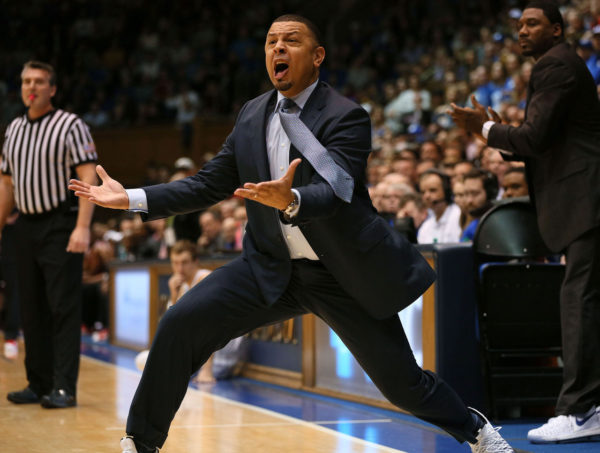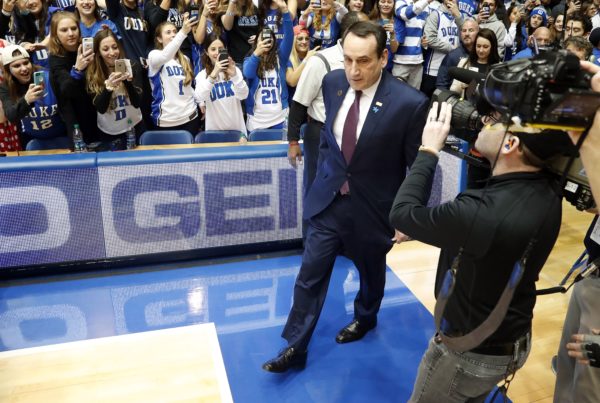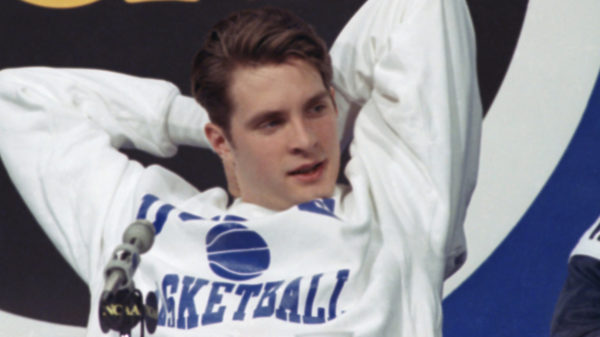Media Timeout: If It Bleeds, It Leads – Especially If It’s Duke
Posted by Will Tucker on February 7th, 2017College basketball places huge emphasis on individual games — showdowns between top-ranked teams, annual rivalry clashes, single-elimination tournaments — but it’s important from time to time to take a step back and look at the bigger picture. The Media Timeout considers how fans and journalists watch, follow and talk about the sport.
For the second time in as many seasons, Duke entered February with five or more losses. Four of those have come in conference play, where Duke sits in the middle of the ACC log jam. What began as a National Title march went way off course over the winter break. First, the Blue Devils lost to Virginia Tech for the first time since 2011, with their best player riding the pine after losing his captaincy. Then they lost head coach Mike Krzyzewski to back surgery and a lengthy recovery. Then they lost access to their own locker room after falling to NC State in Cameron Indoor Stadium for the first time since 1995.

Assistant Jeff Capel presided over a rocky 4-3 stretch in Mike Krzyzewski’s absence (Mark Dolejs/USA TODAY Sports)
It’s safe to say Duke has staunched the bleeding after winning back-to-back ACC road games and escaping last-place Pitsburgh over the weekend with Krzyzewski back on the bench. But with plenty of questions remaining ahead of a date with North Carolina this week, it’s also too early to claim that the Blue Devils have righted the ship. In spite of Duke’s undistinguished resume and erratic play, the preseason #1 team remains a fixture in national headlines and ESPN segments. Why? The obvious answer is Grayson Allen, the embattled preseason Player of the Year pick whose volatile play and widespread criticism has delighted those who can’t stand his petulant and, at times, dangerous behavior on the court. But Allen obviously isn’t the first high-profile college player to behave badly, and the gleeful spectacle around his slow unravelling speaks to greater forces at play.
POY – Pariah of the Year
Allen received a lot of hype during the offseason, and he’s become a household name in his junior season – but for all the wrong reasons. There’s no need to enumerate those reasons here, because Allen’s every macroaggression has been painstakingly documented and analyzed by everyone with a byline or a Twitter handle. (And, after all, he’s a 21-year-old amateur athlete whose worst offense is an ineffectual and sort of clownish brand of violence.) However, it’s worth taking stock of some of the more unusual – and often cringe-worthy – moments in season two of the Allen media saga. Columnists everywhere, predictably, lined up to condemn Allen’s behavior, while some opted instead to chastise the media for fixating on it. Elsewhere on the Internet, we saw wildly speculative musings on his mental health. We saw ESPN producers go split-screen during a game broadcast to accommodate a dedicated “Grayson cam.” We even saw Allen – basically in meme form – became the subject of a high-profile Twitter fight between Deadspin and a prominent US senator.
Here’s a still of Seth Greenberg and two SportsCenter hosts pantomiming Grayson Allen’s body-movement tendencies. This is where we’re at. pic.twitter.com/K8i1v794GA
— Matt Norlander (@MattNorlander) January 11, 2017
ESPN analyst Seth Greenberg came to Allen’s defense during a ridiculous TV segment on the set of SportsCenter, re-enacting an alleged trip against a Boston College player that Greenberg ultimately deemed a “non-issue.” Two weeks later, he called for Allen to sit out the remainder of the season, for his own sake. The discussion finally crawled from the circus into the gutter once Greenberg’s ESPN colleague Michelle Beadle stated unequivocally on SportsNation that Allen ought to be “knocked out” by an opponent: “I don’t need him to be punished. I don’t need mommy and daddy to step in. I need an opponent to say ‘enough.’” Not a good look, obviously. But what is it about Allen that could elicit such a strong reaction in a seasoned pundit who, to this writer’s knowledge, has never gone on air and incited vigilante justice against a collegiate athlete?
Coach K: Saintly or Just Pious?
More than preseason hype or any single player’s behavior, much of the disdain for Duke can be traced to its iconic leader, “Coach K.” Singularly accomplished and viewed in some circles as college basketball’s elder statesman, the Hall of Fame coach commands a certain begrudging respect even from those who don’t like him. But his demeanor, traditionalism and coaching style are deeply polarizing. He often comes off as elitist, sanctimonious and pedantic. His patina of unimpeachable moral rectitude especially chafes at those who insist that no one can compete at Duke’s level without getting their hands a little dirty. His critics’ resentment goes beyond Krzyzewski’s own actions; they also take issue with fawning media coverage and preferential treatment by sports journalists in general. (The hypothetical “imagine if John Calipari did that” has become a common refrain on sites like Deadspin.)
Krzyzewski’s handling of the Allen debacle this season has exposed his tactics as a coach and mentor to renewed scrutiny, and unleashed a wave of criticism regarding the cagey and combative posture he’s assumed toward the media. Coach K’s triumphant return to the sidelines over the weekend was accompanied by yet another tripping incident, and while this one appeared completely inadvertent, it’s a reminder that Allen’s behavior – and his coach’s response – will remain under the microscope all season long.
“The Duke Villain We’ve All Been Waiting For”
Long before Allen first tripped another player in a college game, he was probably destined to be widely disliked as soon as he donned a Duke uniform. Even in April 2015, while the confetti from Duke’s most recent National Championship was still settling on the floor in Indianapolis, the freshman role player had already been tagged as “the Duke villain we’ve all been waiting for.” That prediction came to pass once he worked his way into the starting lineup the next season, at which point he joined an infamous lineage of college hoops villains that spans from Christian Laettner to Steve “Wojo” Wojciechowski to J.J. Redick and beyond. That wasn’t always the case. Go back to 1986, one of Coach K’s early years at Duke and Jay Bilas’ senior year, and try to wrap your head around this lede on the morning of the title game against Louisville: “Duke, a private, richly endowed university, is not a blue-collar school. But it has a blue-collar basketball team.” That was before Duke had won any of its five championships, when the school was still regarded as a plucky underdog despite its privileged reputation. Needless to say, those days are long gone (although, as ESPN‘s Dana O’Neil points out, Duke’s white villains still generally come from modest upbringings, with the notable exception of Allen).
A lot of ink has been devoted to deconstructing Duke villainy and its place in American basketball lore. Sporting News‘ Sean Gentille did so masterfully in a column last year after Redick dismissed the Duke villain as a myth perpetuated by the media and opposing fans who, he argued, arbitrarily “anoint” a white Duke villain every year (he insisted that Allen, John Scheyer and Greg Paulus are some of the nicest guys he’s ever met). Gentille dismantled that interpretation, showing instead how the combination of individual ability, hubris and team success – a recipe perfected in the Laettner era – has made Duke’s villains uniquely easy to hate. He especially took issue with Redick’s suggestion that Duke’s white players are unfairly persecuted:
There are worse fates to befall a human being than being an elite, white basketball player. If you qualify as such, congratulations on your luck and your hard work. If you want to add “beloved by fans across the country,” to the list of attributes, go somewhere else. You know what you’re getting into.
Ask any Kentucky fan who was old enough to form memories in the early 1990s, and they’ll likely agree with this overall assessment of Duke “hateability.” Ditto for North Carolina fans, or Maryland fans, or fans of just about any other program who were paying attention while Coach K was building his dynasty.
Basketball Populism
Of course, that trifecta of high winning percentages, talent and cockiness could apply just as much to a lot of Kentucky, Kansas and UNC teams, but Duke’s success is uniquely positioned at the nexus of race and privilege. Basketball fans look at Duke and see an exclusive private school with a revolving door of highly recruited, clean-cut white players in its rotation.
Rush the Court ACC columnist Brad Jenkins knows Duke well, having followed the ACC and the Blue Devils’ program closely for 35 years. He points out that the democratization of media has made Duke an especially easy target for criticism. “There is natural resentment among the masses to perceived elitism, and it’s the masses who drive things now with social media,” Jenkins explained. “Duke and other private schools don’t have the support of huge alumni bases and entire states to defend them.”
That numbers game doesn’t just play out in Twitter spats between devoted fans. Jenkins points out that, even if only subconsciously, it can be tempting for writers to take the path of least resistance when going after teams: “It’s a lot easier to write something negative about Duke and have 1,000 people come back at you, rather than deal with 1,000,000 pissed-off folks in the state of Kentucky or Indiana.” None of this is necessarily unfair to Duke, Jenkins is quick to add. It’s just the reality that its fans, coaches and players should all understand by now. Anyone who’s sick of the ongoing media spectacle around Duke should understand that, too – and brace themselves for more. As long as there’s turmoil in Durham, you can bet the Blue Devils be on the front page, regardless of wins and losses.













































